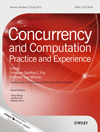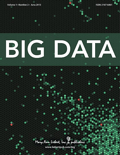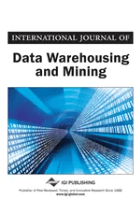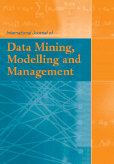
Journal of Big Data
Scope & Guideline
Shaping the Future with Cutting-Edge Data Research
Introduction
Aims and Scopes
- Data Quality and Integrity:
Research on frameworks and methodologies to ensure high standards of data quality and integrity in big data systems, including the evaluation of data quality in artificial intelligence applications. - Machine Learning and Deep Learning Applications:
Focus on the application of machine learning and deep learning techniques to various domains, including healthcare, finance, and environmental science, for tasks such as prediction, classification, and anomaly detection. - Data Privacy and Security:
Exploration of techniques and frameworks to enhance data privacy and security, particularly in the context of big data analytics, including the development of intrusion detection systems. - Big Data in Healthcare:
Investigation of big data analytics applications in healthcare, including predictive modeling for patient outcomes, disease detection, and personalized medicine. - Interdisciplinary Applications of Big Data:
Addressing the intersection of big data with various fields such as social sciences, environmental studies, and economics, to derive insights and support decision-making. - Big Data Technologies and Frameworks:
Research on technological advancements in big data processing frameworks, tools, and architectures, including cloud computing and distributed systems.
Trending and Emerging
- AI and Machine Learning Integration:
There is an increasing emphasis on integrating artificial intelligence and machine learning techniques with big data analytics to enhance predictive capabilities and automate decision-making processes. - Health Informatics and Predictive Medicine:
A growing interest in leveraging big data for health informatics, focusing on predictive analytics for early disease detection and personalized treatment strategies. - Data Privacy Enhancements:
Research into advanced methods for ensuring data privacy and security, particularly in the context of increasing data breaches and privacy regulations, is gaining momentum. - Sustainable and Green Data Practices:
Emerging studies focus on the sustainability of data practices, exploring how big data can contribute to environmental sustainability and the responsible use of resources. - Enhanced Visualization Techniques:
There is a trend towards developing sophisticated visualization methods to better interpret and communicate insights derived from big data analyses. - Real-Time Data Processing:
An increasing number of publications are focusing on real-time data processing techniques, reflecting the need for immediate insights in various applications, from finance to emergency response.
Declining or Waning
- Traditional Statistical Methods:
There has been a noticeable decline in the focus on traditional statistical methods for data analysis in favor of more advanced machine learning and deep learning approaches. - Basic Data Management Techniques:
The emphasis on basic data management practices appears to be decreasing, as researchers are increasingly pursuing more complex and integrated big data solutions. - Stand-alone Data Processing Tools:
The trend is moving away from isolated data processing tools towards integrated frameworks that combine multiple functionalities for big data analytics. - General Surveys and Reviews:
While surveys and reviews are still published, there is less frequency of broad, general reviews; the focus is shifting towards more specific applications and advanced methodologies.
Similar Journals

INTERNATIONAL JOURNAL OF COOPERATIVE INFORMATION SYSTEMS
Exploring Synergies in Computer Science and Information SystemsINTERNATIONAL JOURNAL OF COOPERATIVE INFORMATION SYSTEMS
Published by WORLD SCIENTIFIC PUBL CO PTE LTD, the INTERNATIONAL JOURNAL OF COOPERATIVE INFORMATION SYSTEMS plays a pivotal role within the fields of Computer Science and Information Systems. With a focus on the development and application of cooperative information systems, this journal aims to foster innovation and collaborative research among scholars and professionals. Established in 1996, the journal has consistently published high-quality research that contributes to a better understanding of cooperative methodologies, enhancing system efficiencies across various applications. While its impact factor remains undisclosed, the journal is positioned in the Q4 category of the Scopus rankings, indicating a growing presence in the academic community. Although it does not offer open access, its rich repository of articles remains accessible to subscribers and relevant institutions. Located in Singapore, this journal will continue to serve as a critical resource for researchers, practitioners, and students keen on exploring the evolving dynamics of information systems in today's interconnected world.

Journal of Internet Technology
Leading the Charge in Tech ResearchThe Journal of Internet Technology (ISSN: 1607-9264, E-ISSN: 2079-4029) is a leading academic publication, fostered by the LIBRARY & INFORMATION CENTER at National Dong Hwa University, Taiwan. Established in 2004, the journal has become an essential resource for researchers, professionals, and students in the fields of Computer Networks and Communications and Software Development, achieving a commendable Q3 ranking in both categories as of 2023. With an impressive track record extending to 2024, the journal offers a platform for disseminating high-quality research and innovative ideas. Notably, it ranks #212 out of 395 in Computer Networks and Communications and #251 out of 407 in Software as per Scopus metrics. The journal remains committed to advancing knowledge and fostering interdisciplinary collaboration in the rapidly evolving digital landscape, making it a vital tool for those looking to stay at the forefront of internet technology research.

Journal of Information Processing Systems
Connecting Minds in Information Processing ExcellenceJournal of Information Processing Systems, published by the Korea Information Processing Society, serves as a pivotal platform in the fields of Information Systems and Software, catering to an audience of researchers, professionals, and students. With an ISSN of 1976-913X and an E-ISSN of 2092-805X, this journal has established its presence since its inception in 2012, continually contributing valuable insights and advancements through 2024. Notably, it has achieved a Q3 ranking within its respective categories, reflecting its ongoing commitment to quality research, evidenced by its Scopus rankings—#221 out of 394 in Information Systems and #263 out of 407 in Software. Although it currently does not offer Open Access, the journal emphasizes robust research methodologies and innovative solutions, making it an essential resource for those engaged in the rapidly evolving domain of information processing. With its base located in Seoul, South Korea, the journal remains dedicated to fostering collaboration and knowledge exchange in the global community.

Big Data Mining and Analytics
Advancing Knowledge Through Data InnovationBig Data Mining and Analytics, published by TSINGHUA UNIVERSITY PRESS, stands at the forefront of interdisciplinary research in the fields of Artificial Intelligence, Computer Networks and Communications, Computer Science Applications, and Information Systems. With an impressive Q1 ranking in multiple categories as of 2023, this journal serves as a critical platform for researchers and professionals eager to explore innovative techniques and methodologies related to big data analytics. Since its transition to Open Access in 2018, Big Data Mining and Analytics has aimed to increase the visibility and accessibility of its cutting-edge research, making permanent strides in the global academic landscape. Housed in Beijing, China, and actively embracing the converged years from 2018 to 2024, the journal aims to cultivate a rich discourse on emerging trends and applications, ensuring its relevance in a rapidly evolving technological environment. Join a vibrant community of scholars dedicated to advancing the frontiers of knowledge in big data.

CONCURRENCY AND COMPUTATION-PRACTICE & EXPERIENCE
Bridging Theory and Practice in Computer ScienceCONCURRENCY AND COMPUTATION-PRACTICE & EXPERIENCE, published by Wiley in the United Kingdom, serves as a pivotal platform for advancing research and innovation in the fields of computational theory, computer networks, and practical applications of computer science. With an impressive impact factor and recognition in the Q2 category for disciplines such as Computational Theory and Mathematics, this journal attracts a diverse range of scholarly articles that address the current challenges and developments in these areas. It boasts a comprehensive viewership with options for Open Access, enabling wide dissemination of knowledge. Indexed by Scopus with notable rankings in multiple categories, including a remarkable position in Computational Theory and Mathematics (Rank #41/176), the journal not only elevates academic discourse but also fosters collaboration among researchers, professionals, and students alike. As it progresses toward its 2024 milestone, CONCURRENCY AND COMPUTATION-PRACTICE & EXPERIENCE remains dedicated to publishing high-quality research that prepares its readership for the evolving technological landscape.

International Journal of Web Services Research
Pioneering Research for Tomorrow's Web SolutionsThe International Journal of Web Services Research, published by IGI Global, is a premier forum dedicated to advancing research and innovation in the field of web services. With an ISSN of 1545-7362 and an E-ISSN of 1546-5004, this journal has steadily contributed to the discourse on computer networks, information systems, and software development since its inception in 2004. Based in the United States, the journal publishes high-quality research articles that delve into cutting-edge web service technologies and methodologies, making it an invaluable resource for researchers, professionals, and students alike. Although categorized in the Q4 quartile in 2023 across several classifications, its growing impact and relevance are reflected in its ongoing engagement with contemporary issues in the web services landscape. As an academic platform, it aims to provide a comprehensive understanding of the dynamics of web services and their implications for future technological advancements. Researchers are encouraged to contribute their findings to foster knowledge sharing and collaboration within this vital domain.

Big Data
Empowering researchers in the era of big data.Big Data, an esteemed journal published by MARY ANN LIEBERT, INC, serves as a leading platform within the realms of computer science and information systems. Launched in 2013, this journal has made significant strides in shaping the discourse around the management, analysis, and applications of large-scale data. With a commendable impact factor reflected in its 2023 quartile rankings—Q1 in Information Systems and Management, and Q2 in both Computer Science Applications and Information Systems—Big Data is recognized for its quality and influence, holding a notable position in Scopus rankings. Renowned for its rigorous peer-review process, the journal welcomes original research, reviews, and discussions that address the challenges and innovations associated with big data technologies. Researchers, professionals, and students alike will find Big Data an indispensable resource that not only highlights emerging trends but also fosters collaboration and knowledge sharing within the data science community. Access options are available through institutional subscriptions and individual access, ensuring a broad dissemination of critical research findings.

International Journal of Data Warehousing and Mining
Navigating the Depths of Data AnalyticsInternational Journal of Data Warehousing and Mining, published by IGI Global, is a vital resource in the field of data management and analytics, catering to researchers, professionals, and students alike. With ISSN 1548-3924 and E-ISSN 1548-3932, this journal has been at the forefront of disseminating pioneering research since its inception in 2005 and will continue to do so through 2024. Despite its current categorization in the Q4 quartile for Hardware and Architecture as well as Software, and its Scopus rankings, the journal aims to foster innovation within the domains of data warehousing, data mining, and their applications across various sectors. The absence of an open access option does not diminish its significance; rather, it ensures that the journal maintains rigorous peer-review standards, providing high-quality research outputs that contribute to ongoing discussions and advancements within the field. Researchers and practitioners looking to stay updated on the latest trends and methodologies will find the International Journal of Data Warehousing and Mining an indispensable tool in their academic and professional endeavors.

Journal of Information Assurance and Security
Upholding Privacy Through Groundbreaking Studies.Journal of Information Assurance and Security, an esteemed publication by DYNAMIC PUBLISHERS, INC, serves as a pivotal platform for the dissemination of innovative research and insights in the field of information security and assurance. With its ISSN 1554-1010 and E-ISSN 1554-1029, this journal addresses critical vulnerabilities, emerging technologies, and methodologies that fortify data integrity and uphold privacy in our increasingly digital world. Although specific metrics such as the HIndex and Scopus ranks are currently unavailable, the journal is recognized for its contributions to both academia and industry, fostering collaboration among researchers, professionals, and students dedicated to advancing security protocols. The journal does not currently offer open access but ensures comprehensive accessibility through institutional subscriptions. As cybersecurity continues to be a paramount concern globally, the Journal of Information Assurance and Security stands out as an essential resource for groundbreaking studies and practical applications that drive the future of information protection.

International Journal of Data Mining Modelling and Management
Advancing Insights through Innovative Data MiningInternational Journal of Data Mining Modelling and Management, published by InderScience Enterprises Ltd, is a prominent academic platform dedicated to the exploration and advancement of data mining techniques and their applications across various domains. Located in the picturesque environment of Geneva, Switzerland, this journal serves as a crucial resource for researchers, professionals, and students engaged in the fields of Computer Science, Management Information Systems, and Modeling and Simulation. With an ISSN of 1759-1163 and an E-ISSN of 1759-1171, the journal has steadily converged its scope from 2008 to 2024, emphasizing innovative methodologies and dynamic developments in data analytics. Although currently categorized in Q4 for several relevant fields according to 2023 quartiles, the journal is committed to elevating its impact and outreach through rigorous peer-reviewed research, making it an essential read for those aiming to stay at the forefront of data-driven decision-making and management practices. Whether you are a seasoned researcher or an eager student, the International Journal of Data Mining Modelling and Management offers invaluable insights and contributions to the evolving conversation in data science.